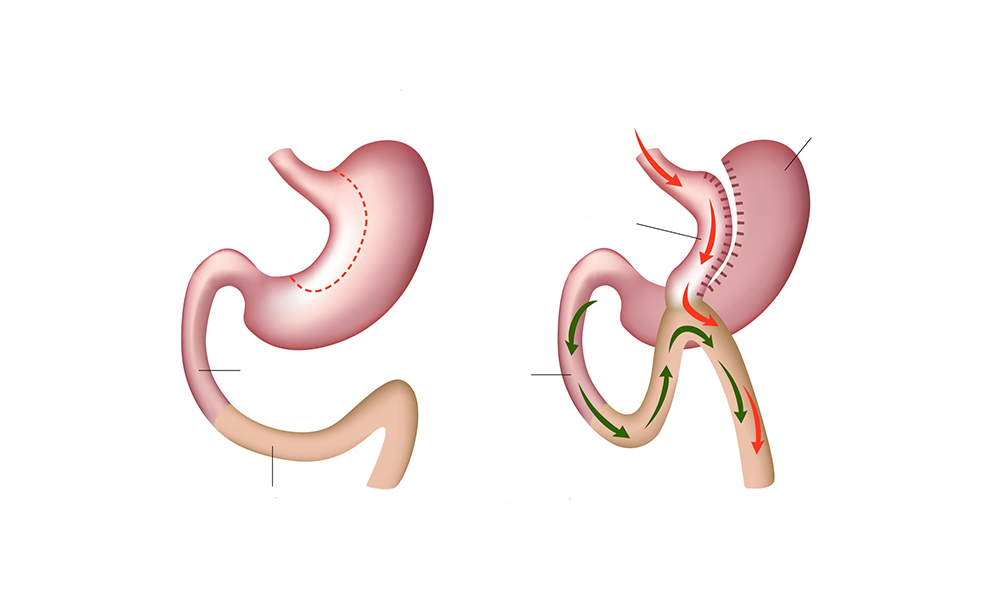
Mini Gastric Bypass: An Overview
Mini gastric bypass (MGB) is a type of bariatric surgery that helps individuals achieve significant weight loss by limiting the amount of food they can consume and altering the digestive process. This procedure is an alternative to other weight loss surgeries such as gastric bypass, sleeve gastrectomy, and adjustable gastric banding.
What is a Mini Gastric Bypass?
MGB is a restrictive and malabsorptive procedure that works by reducing the size of the stomach and rerouting the small intestine to the newly created pouch. This reduction in the size of the stomach limits the amount of food that can be consumed and the rerouting of the small intestine reduces the amount of calories absorbed by the body.
The procedure is minimally invasive, meaning that it is performed through a small incision using a laparoscope, a type of instrument with a camera that allows the surgeon to visualize the inside of the abdomen. This results in a smaller scar, less pain, and a quicker recovery compared to traditional open surgery.
Who is a Candidate for Mini Gastric Bypass?
Mini gastric bypass is usually recommended for individuals with a body mass index (BMI) of 40 or higher, or a BMI of 35 or higher with obesity-related health problems. The procedure is also recommended for individuals who have not been successful with non-surgical weight loss methods.
What Can I Expect During the Recovery Period After Mini Gastric Bypass?
After the procedure, patients usually stay in the hospital for one to two days. They will need to follow a strict liquid diet for the first two weeks, gradually transitioning to solid foods as they heal. Most patients can return to their normal activities within two to four weeks after the procedure.
Are There Any Long-Term Risks Associated with Mini Gastric Bypass?
Like any surgery, mini gastric bypass carries certain risks, including bleeding, infection, and blood clots. Additionally, there is a risk of staple line leaks, stomach obstruction, and changes in the way food moves through the digestive system. Long-term complications, such as vitamin and mineral deficiencies, and the need for revision surgery may also occur. It is important to discuss the potential benefits and risks of the procedure with a qualified bariatric surgeon to ensure that you fully understand the risks and benefits involved.
How much do you have to weigh to get a mini gastric bypass?
The criteria for mini gastric bypass surgery typically involves having a Body Mass Index (BMI) of 40 or higher, or a BMI of 35 or higher with co-existing health problems related to obesity, such as type 2 diabetes or high blood pressure. However, some bariatric surgeons may also consider patients with a lower BMI for the procedure if they have tried and failed to lose weight through other means, such as diet and exercise.
It’s important to note that mini gastric bypass is not a quick fix for weight loss, but rather a tool to help individuals achieve and maintain long-term weight loss. The ideal candidate for mini gastric bypass is someone who is committed to making permanent lifestyle changes, including diet and exercise, to support their weight loss journey.
Comparing Mini Gastric Bypass and Sleeve Gastrectomy
Both mini gastric bypass and sleeve gastrectomy are bariatric surgery procedures designed to promote weight loss, but they work differently. Sleeve gastrectomy involves removing a large portion of the stomach to limit the amount of food the stomach can hold, while mini gastric bypass involves rerouting the digestive system to bypass a portion of the stomach and small intestine.
The amount of weight loss achieved with each procedure can vary from person to person, but both procedures are typically associated with significant weight loss. The choice between the two procedures will depend on several factors, including the individual’s medical history, their overall health, and their personal preferences.
Patients who are considering bariatric surgery should discuss the pros and cons of each procedure with their bariatric surgeon to determine which one is right for them. Both mini gastric bypass and sleeve gastrectomy offer a number of benefits, including promoting weight loss, improving obesity-related health problems, and increasing overall quality of life. It is important to make an informed decision with the guidance of a qualified bariatric surgeon to ensure the best possible outcome.
It’s also important to note that both mini gastric bypass and sleeve gastrectomy are lifelong commitments, requiring lifestyle changes and ongoing monitoring and follow-up care. Patients will need to make permanent changes to their diet and exercise habits to maintain their weight loss and achieve the best possible results.
In conclusion, both mini gastric bypass and sleeve gastrectomy can be effective weight loss solutions for those who are struggling with obesity. The decision between the two procedures will depend on the individual’s unique needs and circumstances, and it’s important to seek guidance from a qualified bariatric surgeon to determine which procedure is best for you.
Conclusion
Mini gastric bypass is a type of bariatric surgery that helps individuals achieve significant weight loss by limiting the amount of food they can consume and altering the digestive process. This procedure is a minimally invasive alternative to other weight loss surgeries and can lead to significant weight loss and improved obesity-related health problems.
- However, like any surgery, mini gastric bypass carries certain risks, including bleeding, infection, and blood clots. Long-term complications, such as vitamin and mineral deficiencies, and the need for revision surgery may also occur.
- It is important to discuss the potential benefits and risks of the procedure with a qualified bariatric surgeon to ensure that you fully understand the risks and benefits involved.
- Mini gastric bypass is a lifelong commitment, requiring lifestyle changes and ongoing monitoring and follow-up care.
- Patients will need to make permanent changes to their diet and exercise habits to maintain their weight loss and achieve the best possible results.
In conclusion, mini gastric bypass can be a highly effective weight loss solution for those struggling with obesity, but it’s important to make an informed decision with the guidance of a qualified bariatric surgeon.













I had tube stomach surgery to my teacher İbrahim. I was very nervous before the surgery. The teacher explains everything in great detail. I didn't have any pain except for the first few hours after the surgery. I feel very good now. Thank you very much to my teacher and his team. I would recommend it to everyone.
Hi Ibrahim Elif beceremed from Aksaray to be weak after many years until they met our teacher today I follow my 3 day agackiran fortunately our teacher friendly operation evimdeyim positive energy once you get to know and I regret it I wish I didn't know what fear is before you panic if I was my suggestion to everyone is our teacher closed his eyes forget about everything gelinkimse Ibrahim's smile makes all the guarantees which I thank very much for everything you people must be happy happy like I've known pain make sure you thank God for each valuable sehirde
Hi, I tried everything for the sake of slimming years and now stomach surgery but I didn't get the result but I was too scared I'd decided to have a teacher Ibrahim afterwards, I found there was around me afterwards, I went to see her surgery in patients with and for the first time I saw a doctor speaks so loud and clear. i had surgery 2 days ago and everything is very nice now and I am standing up, I have started my walks. Thank you very much to my teacher and his team, if you have such an opinion without the slightest hesitation, I would say meet with Ibrahim teacher without wasting time, you will never regret it...
He is the sweetest, most smiling, most affectionate, most sincere and such a successful doctor I have ever seen in my life. I felt not like I was visiting a doctor, but like I was visiting someone from my family. I couldn't even go to the preliminary interview because I was afraid for years, my teacher convinced me in 10 minutes for obesity surgery. I had surgery about a week ago, I'm taking good care of my two children right now, and I've even been able to return to my job, I'm glad that you exist, Ibrahim teacher, I love you very much.